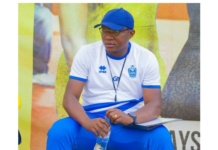The head of the supervisory board of German football club, Clemens Tönnies, is to temporarily step down after he was found to have broken anti-discrimination rules, according to Deutsche Welle.

A meeting of Schalke’s honorary board on Tuesday deemed that comments made by Tönnies at an event in Paderborn recently went against the club’s anti-discrimination policy but “came to the conclusion that the allegation of racism is unfounded”.
While discussing potential tax increases to fight climate change, Tönnies told the Paderborn event that it was better to finance 20 power plants a year in Africa. “Then the Africans would stop cutting down trees, and they would stop making babies when it gets dark,” he said.
The comments were widely interpreted as racist and Tönnies later apologized both in a statement issued by Schalke and on Twitter, where he said: “I am for an open and diverse society. I am sorry for the comment on the large number of children in Africa.”
Tönnies will step down from his position on the board for three months at which point he is expected to return, according to a statement put out by the club on Tuesday evening, Deutshe Welle says.
CNN reports that Germany’s Justice Minister Christine Lambrecht has led calls for Tönnies’ comments to be punished.
Deutsche Welle (DW) spoke with fan culture and extremism researcher Robert Claus (RC) about what consequences Clemens Tönnies should face.
DW: Mr. Claus, you will have heard about the statement from Schalke supervisory board chairman Clemens Tönnies on Africa. What was your initial reaction?
Robert Claus: I was shocked by these racist and colonialist statements. It also alarmed me that these came from a Schalke executive. The “Schalke fan initiative against racism” is one of the oldest in Germany.
DW: The public has debated for days about Tönnies and his statements, even national politicians have spoken on the issue. What should be done?
Robert Claus: On the one hand, such statements do not do justice to the office of that Mr. Tönnies holds. He needs to face the consequences. On the other hand, the fact that some applauded him and no one objected [when Tönnies made the statement during a speech] shows how established racist statements are in civil circles.
DW: In your view, could a quick and sincere apology to those he insulted – not Schalke fans – have defused the situation? Or were his remarks too grave for that?
Robert Claus: It’s nothing new. The topic of migration and racism has been hotly debated for many years in Germany. A five-sentence apology is too tight-lipped in such a debate. A superficial approach is not sufficient. You can’t simply return to business as usual.
DW: If Tönnies doesn’t step down, will it send a fatal signal for the credibility of the fight against racism in football in general? Or just at Schalke?
Robert Claus: Of course, a lack of consequences would significantly damage the credibility of the campaign against racism in football. Either Tönnies steps down, or he quickly lays out a serious plan of how he wants to strengthen the work against racism in the company he runs and at Schalke – through educational seminars for high-ranking officials, for instance. However, it will be hard for him to put things right.
DW: Are there aspects of this whole discussion that, in your mind, are either not being addressed at all or not being sufficiently addressed?
Robert Claus: Racism in football is often only discussed when it comes from right-wing hooligans, i.e. the fan scenes. There is a long list of initiatives against fan racism, as well as socio-educational fan projects. But there are hardly any professional football clubs that have firmly integrated diversity and anti-discrimination into their personnel policy and consistently implemented it in employee training. Instead, often corporate videos are produced that collapse like a house of cards when management makes statements like this. There need to be more internal seminars up to the highest levels of management to sensitize the people involved.
DW: Do you consider the current response and the reactions from the DFB (German FA) and club representatives to be appropriate? Or do you think there should be a clearer response from the football industry?
Robert Claus: Unfortunately, there only have been a few big names that have come out critically, namely Hans Sarpei, Gerald Asamoah, Cacau – three black former footballers – and Reinhard Rauball. But no current national team players. In particular, people who are not affected by racism are called upon to show their solidarity. But either there is either a lack of awareness or a fear of tainting one’s own career. Both would be fatal.
Schalke start their Bundesliga season on August 17.
Kindly follow us on twitter:@AfricanVoice2








